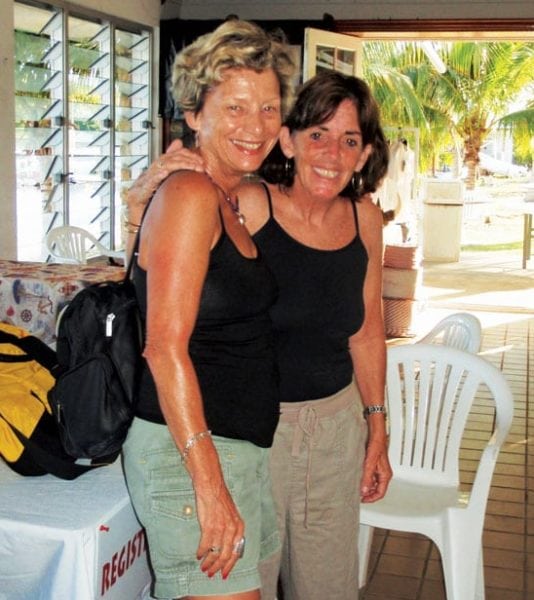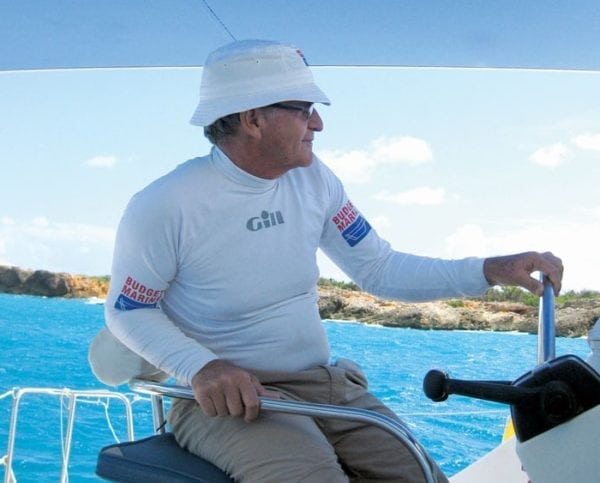
There’s a saying, ‘hindsight is 20/20’. While it’s too soon to predict the severity of the 2018 hurricane season, which started June 1st, All At Sea did ask well-known Caribbean marine community members on the hardest hit islands last year to offer the wisdom of their hindsight and a perfect vision for hurricane preparation.
REALLY BE PREPARED
“We deal with hurricane season every year, but the last one really shook us and as a result we revisited our entire operations, the premises, communication and safety plans and looked at how to improve, be more efficient and set priorities,” says Michele Korteweg, general manager of the St. Maarten Yacht Club. “We realized that we didn’t have a detailed plan for coping with the aftermath, which has now been included. This was due to not knowing what to expect. Now we have a better idea and can prepare accordingly.”

Beware and be prepared for the ‘burn-out’ problem, adds Julie San Martin, co-director of the St. Croix International Regatta (SCIR) and owner with husband Joe of the Teagull 23, Piglet. “In an active season, we may receive watches, even warnings, as early as July. What happens is that after four or six full blown hurricane drills, and no hurricanes, we get tired of prepping by September and October, when we are at the greatest risk.”

CHECK INSURANCE
The number one rule for mariners, according to Dick Schoonover, manager of the crewed yacht clearinghouse, CharterPort BVI, in Tortola, is: “Reread your insurance policy and your hurricane plan. Double check with your insurer that your hurricane plan is indeed on file with the insurer (and not merely the insurance agent), that it meets with their approval (in writing) and that you have complied with the approved plan when hurricane-readying your vessel. Also, take photos of your preparations and e-mail them to your insurer, just in case your phone gets lost.”

Regardless of whether you are insured or not, says Oriel Blake, executive director of the Virgin Islands Professional Charter Association in St. Thomas, “take the precaution of hauling out with a very secure tie down or sailing out of the hurricane belt altogether well in advance of tropical storms tracking north.”

SECURE YOUR VESSEL
“If you must weather a hurricane,” says Antigua’s Bernie Evan-Wong, who owns several boats and sailed in St. Maarten, U.S. and BVI-based regattas this spring, “the two best options are a really strong single point mooring (like Helix Type screw moorings) with plenty of room to swing or dry storage in a cradle with the rig removed.”

Many boats in hurricane shelters in the BVI were damaged due to the cleats rather than anchors giving way, says Judy Petz, the Tortola-based director of the BVI Spring Regatta. “Check all cleats and tie to more than just the bow and stern.”

On shore is where St. Maarten’s Robbie Ferron, an avid racer, regatta organizer and general manager of Budget Marine, would be if he still had a boat, he says. “I would be much more demanding on the placement and tie up. Effectively dealing with extreme weather calls for use of extreme measures. Go all the way. Double the rope size, double the hold down weights, double the chain cleat wraps, double what you allow for storm surge and take off much more windage creating items. Also, be aware of storm surge. For the first time since I’ve lived in St. Maarten, the storm surge did what we had been warned about. Damage would have been a great deal less without the storm surge.”
Consider laying your boat down, says Karen Stanton, co-director of the St. Croix International Regatta and boat owner. “We did lay a few boats down here at St. Croix Yacht Club (we actually ran out of jack stands) and positioned them with hopes nothing would fall on them. They did just fine. Some of our boats in the yard on trailers and jack stands blew over.”

Perhaps the most important insight from Phil Blake, general manager at IGY’s Yacht Haven Grande Marina on St. Thomas is for boat owners to be responsible. “There were simply too many owners (uninsured in the majority of cases) who effectively abandoned their anchored or moored vessels in the harbor to the mercy of the storms, which subsequently caused serious damage to other people’s boats, properties and surrounding facilities.”
PLAN FOR COMMUNICATIONS
Communications proved difficult in the immediate post-storm aftermath.
“Handheld VHF radios (not affected by the largely downed telecommunications infrastructure or lack of mains power) proved useful for us as a team last year,” says Blake. “For this storm season, we’ll be using a satellite communications device to ensure our ability to communicate with our stakeholders and guests overseas.”
RIDE OUT THE STORM ASHORE
Ensure your safety above anything else.
“Don’t ride out the storm on your boat,” recommends David Kerr, Puerto Rico-based race officer and regatta organizer.
Sint Maarten’s Korteweg agrees and adds, “I understand how people feel about leaving their homes (whether afloat or ashore). I did it myself as I was worried whether my roof would hold. It didn’t, and I couldn’t be more grateful that I stayed with friends instead. You can replace your belongings, not your life.”
Carol M. Bareuther, RD, is a St. Thomas, U.S. Virgin Islands based marine writer and registered dietitian.




